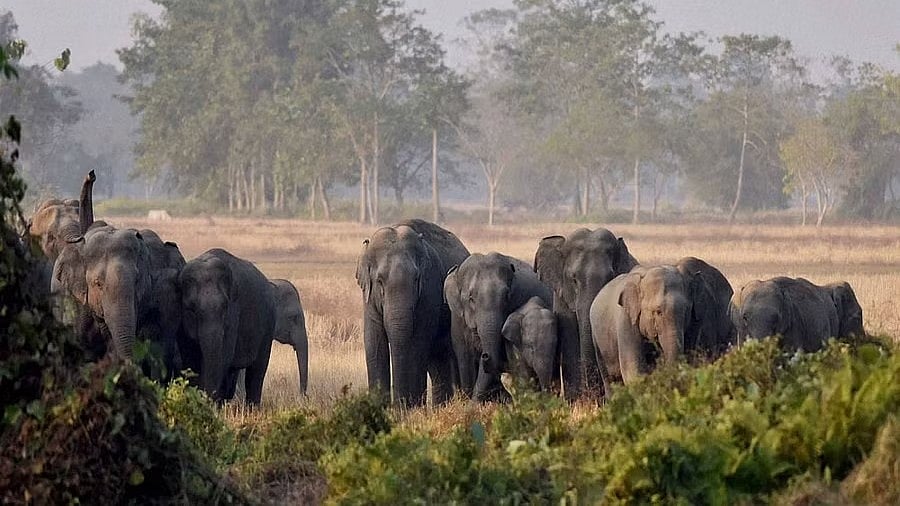
Image showing elephants. (For representation)
Credit: PTI File Photo
Bengaluru: Faced with rising man-elephant conflicts, the Karnataka Forest Department has developed 'KP Tracker' a home-grown 'radio collar' to monitor problem elephants at a fraction of a cost while reducing the weight of the device and the waiting time in importing it.
Elephants account for a major part of all wildlife conflict incidents in Karnataka. While crop raiding is the major complaint, the conflict has claimed lives of both the animals and humans over the years.
Forest, Ecology and Environment Minister Eshwar Khandre said the elephant collar developed indigenously was also ergonomic.
"Till now, we were importing the elephant collars at the cost of Rs 6.5 lakh per unit. The collar made in Bengaluru costs just Rs 1.8 lakh. The weight of the local collar is just 7.5 kg compared with the 16.5 kg weighed by the imported collar," he said.
Additional Principal Chief Conservator of Forest (Wildlife) Kumar Pushkar who initiated the effort and worked with technology expert Gurudeepa from Infiction Labs Pvt Ltd, said the department had to wait for up to 10 months for the delivery of an imported collar. "We can now get a collar within 15-20 days after placing delivery. Moreover, our device, including its circuit and battery, are sourced locally. Hence, it can be easily repaired and replaced, which was impossible with the imported ones," he said.
The department had imported 67 imported collars of which only 27 are functional. Operating the imported device also required specialised knowledge. The lack of option to repair the collars has not only led to waste of resources but also limited the department's efficiency in tracking the problem elephants at a time the conflict incidents have increased.
As per the department, elephants accounted for 22483 (63%) of the 35580 wildlife conflict incidents reported in Karnataka till December of 2024-25. In 2023-24, they accounted for 64% of the 50237 incidents. The numbers were similar for the previous year.
Khandre sought to stress that the elephant problem was not limited to Karnataka, where the population of the pachyderms is estimated at 6395. "Across the country, several states like West Bengal and Odisha are facing elephant conflict. The devices will help in alerting the gram panchayats and village leaders through bulk SMS, helping prevent conflict and improve conservation efforts," he said.
There has been considerable improvement in the technology to track the animals over the years. Earlier, the devices used radio frequency to communicate the position of the animal. The home-grown device is based on GSM-technology with officials hoping that India will be able to deploy satellite-based collars in the next two years.
As per the Union government, about 15 elephants were killed in train accidents every year between 2019-20 and 2023-24, while electrocution claimed 394 during the same time. Besides West Bengal and Odisha, Karnataka, Tamil Nadu, Assam, Kerala and several other states have reported casualties.
Tiger, leopard trackers in 6 months
Khandre said that the department has already begun working on the trackers for tigers and leopards, with a focus on the latter whose numbers are increasing. "We will come up with an indigenous device for them in the coming days," he said.
Pushkar said that they will start testing the belt on one of the big cats in Bannerghatta Zoo. "In the case of elephants we tried the belts on three elephants to check if it leads to any skin irritation. Similarly, we will observe such developments in the big cats during the trial stage. Simultaneously we are working on finalising and fabricating the circuit. We will be ready with the device in about six months," he said.